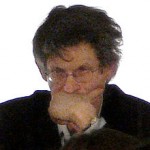
Whenever I feel overwhelmed and overworked, all I need to do is think of Alan Rusbridger.
I just finished reading The Guardian editor’s lovely, heart-opening memoir, Play It Again: Why Amateurs Should Attempt the Impossible, in which Rusbridger comes across as being a disconcerting combination of human and superhuman at the same time.
Rusbridger is a newspaper editor by day — and, as it generally turns out, night — and an amateur pianist by whatever few minutes he can squeeze into his relentless schedule in between the never-ending tsunami waves of the news cycle.
The book chronicles Rusbridger’s Sysiphean attempt to master a fiendishly difficult, ten-minute piece by Chopin, the “Ballade Op 23,” all the while battling a hair-raising stampede of massive breaking news stories including the News of the World phone hacking scandal and the ever-evolving Wikileaks coverage.
As a rookie editor myself taking on my first big project — the launch and leadership of Colorado Public  Radio’s new arts bureau — and an amateur oboist and singer, I connect strongly to Rusbridger’s narrative. His daily push to manage a few minutes of piano practice amid the demands of his hectic day job make me feel like I’m not alone in my quest to eek out a little time for music in the scurry of everyday life.
The book also makes me realize that as busy as I think I am, my level of stress and productivity is nothing on Rusbridger’s — a man who manages to fit in 20 minutes of Chopin almost every day even while facing off against media empires, parachuting into war zones to free correspondents under hostage, writing leaders for The Guardian, appearing before millions of viewers on network TV and making key decisions about the future of the media.
What boggles the mind is how on earth the man manages to also find time to keep such a careful diary of his pianistic progress, interview so many famous pianists and other experts, and produce a book at the end of it all. He must have a very patient family. And a very good personal assistant.
Speaking of family, the only thing about the book that puzzles me is how absent Rusbridger’s people are is from its pages. I don’t envy his wife and kids, who only appear in passing with a handful of brief mentions. Between the news cycle and the piano, I don’t suppose they saw much of their husband and father for a good long while.
I learned a lot from this book not just about its author’s peccadilloes, but also about the joys and importance of amateurism (a topic that I explore myself in relation to singing in a forthcoming Oxford University Press book of essays devoted to the vocal arts), time management, the history and mechanics of the piano, Â Chopin, and the composer’s challenging but beloved first “Ballade.”
Play It Again: Why Amateurs Should Attempt the Impossible, galvanizes me, like Lewis Carroll’s Alice, to attempt as many “impossible things before breakfast” as I possibly can.











